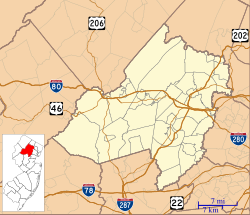Morristown District | |
 Macculloch Hall | |
| Location | Roughly bounded by the cemetery, King Pl., Madison and Colles Aves., DeHart St., and N. Park Pl. Morristown, New Jersey |
|---|---|
| Coordinates | 40°47′38″N74°28′51″W / 40.79389°N 74.48083°W |
| Area | 213 acres (86 ha) |
| Architectural style | Greek Revival, Late Victorian, Classical Revival, Art Deco |
| MPS | Morristown Multiple Resource Area |
| NRHP reference No. | 73001126 [1] (original) 86003109 [2] (increase) |
| NJRHP No. | 2192; 2193 [3] |
| Significant dates | |
| Added to NRHP | October 30, 1973 |
| Boundary increase | November 13, 1986 |
| Designated NJRHP | September 6, 1973 September 11, 1986 |
The Morristown District, also known as the Morristown Historic District, is a historic district in the town of Morristown in Morris County, New Jersey. It was added to the National Register of Historic Places on October 30, 1973, for its significance in architecture, communications, education, military, politics, religion, social history, and transportation.
Contents
The initial district listing had 50 contributing buildings, including the Thomas Nast Home and the Dr. Lewis Condict House, which were previously listed individually on the NRHP, and the Morristown Green. [4] The district boundary was increased from 93 acres (38 ha) to 213 acres (86 ha) as part of the Morristown Multiple Resource Area (MRA) in 1986 and now has 352 contributing buildings, including the Morristown station and the Morris County Courthouse, which were previously listed individually. [5]











